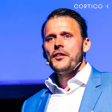Become a Creator today!Start creating today - Share your story with the world!
Start for free
00:00:00
00:00:01

The future of community banking, with Trina Evans and Sujay Saha
Community banks are in the midst of an existential moment. Their traditional strengths have been undermined by the rise of digital banking. And the reality is that they have less money to spend on digital capabilities than their bigger competitors.
KeyBank is bucking the trend, and it is doing so by taking a community ethos and applying it to the digital age. To chat about the KeyBank story, Will is joined by KeyBank's Chief of Staff and the Director of it's Corporate Center, Trina Evans, and the President of Cortico-X, Sujay Saha.
Get in touch with Cortico-X here.
Follow Cortico-X on LinkedIn here.
Transcript
Introduction to Cordico X and Business Transformation
00:00:00
Speaker
Cordico X is an experience-led transformation business that partners with clients and technology companies to drive digital acceleration. We are experience activists, passionate about elevating everyday human experiences through the belief that what's best for people is what's best for an organization. Reach out to us for a chat. A link is in the show notes.
Exploring Business Experience with Will Kingston
00:00:34
Speaker
Hello and welcome to Speaking from Experience from CorticoX, where we speak to the people with experience of experience. I'm Will Kingston.
Challenges for Community Banks in Digital Era
00:00:43
Speaker
Community and regional banks are in the midst of an existential moment. Their traditional point of difference, deep personal relationships enabled by a strong branch network, is arguably less relevant in the age of digital banking. This problem is compounded by the reality that they have less money to spend on digital capabilities than their bigger competitors.
00:01:05
Speaker
This has led to a string of regional bank failures over the last five years.
KeyBank's Community Ethos Approach
00:01:10
Speaker
The Ohio headquartered key bank is bucking the trend and it is doing so by taking that community ethos and applying it to the modern financial services landscape.
00:01:19
Speaker
To discuss how they've done it, I am delighted to be joined by Trina Evans, the Bank's Chief of Staff and Director of its Corporate Centre, and Sujay Saha, President of Cortico X. Trina, I'll start with you. Is that a fair summary? How do you assess the state of regional and community banking in the US today?
00:01:39
Speaker
I believe that it's a really cogent summary of regional banks in particular. And I think maybe even the broader financial services industry, because I think banks, large and small, are really the lifeblood of the world's economies. But if that is true, regional banks, I think, have the opportunity and I like to think the obligation to pump that lifeblood through the communities where we live and work in a way that large banks can't or won't and smaller banks can't. And I think the world is increasingly fast paced. But you know the old saying, the more things change, the more they stay the same. And I think that the constant for bankers that hasn't changed said that is that
00:02:25
Speaker
This is a trust business, trust is foundational to our relationships with clients, but also with our communities. And I think banks, particularly regional banks, you know, pumping that lifeblood through communities, have an obligation to serve every stakeholder, not just its clients, not just its shareholders. And I think the most successful regional banks are positioned as community banks.
00:02:49
Speaker
So, Jay, I'll pick up on a word that Trina used there, which was trust. Now, there are some notable exceptions, but many banks at the moment are struggling to build customer
Regaining Trust in Banks
00:03:01
Speaker
trust. In fact, I think if you looked at trust scores over the last 50 years, I think it would be fair that that most banks are less trusted and financial services as an industry is less trusted than it once was. Why is that the case? And then how can banks start to go about rebuilding or improving trust with their customers?
00:03:19
Speaker
Yeah, lots lots and ah here to unwind, um but I think to the point that Tina just made around trust and people, I feel like what has happened is humanity for which the banks were originally ah created to serve the people.
00:03:37
Speaker
That used to be a lot more of a personalized experience many, many years back, ah very naturally so. Because of the lack of technology, because of the because of the lack of means, we used to wake up in the morning, not me, but folks used to wake up in the morning, they used to get their cup of coffee, go to their bank, or do what they have to do and come back. They trusted the person in front of them.
00:04:00
Speaker
What has happened over a period of time, in my opinion, is with the proliferating technologies, we are able to take ah we have been able the banks have been able to take this service at scale to a lot of people. And with that has created the complications of how do we serve these people, which has translated into more complicated products.
00:04:21
Speaker
And in my opinion, with this rising complications of advancing technologies, types of products that sometimes ah one would say that even financial institutions don't exactly know how much of a risk are they taking. It does create a discomfort in people on whether they really do have backing of somebody.
00:04:42
Speaker
and some institution that they really wanna trust. So I do feel like with advancing technologies now that things have gone are going completely to the next level, it's almost like a 360 degree loop that the financial institutions are taking, that there's so much of transparency that the organizations are going after and the technologies are ah well more advanced to kind of support some of that. I stay optimistic that things are gonna change.
00:05:08
Speaker
I think no matter that something you said, Sujay, is so important, and that is this idea of empathy and humanity as technology kind of overtakes us. It's overtaking us all, whether you're a company or whether you're a person. and I think that no matter how fast we're all moving, no matter the tide of information and options ah that we wade through every day,
00:05:32
Speaker
Nothing will replace the importance of connectivity, of relationship, of empathy, of trust, of being there for our clients, for our communities when they need
KeyBank's Strategy and Community Impact
00:05:43
Speaker
us most. And I think, circling back to Will's question, I think regional banks, community banks are uniquely positioned to deliver on that trust, on that promise of connectivity, on that promise of being in your corner when you need us the most.
00:06:00
Speaker
Let's extend on that because you've mentioned that word community several times now, Trina. It's obviously that community service, that community ethos is so central to what you do at KeyBank. I was stalking your LinkedIn before, and you've actually got a wonderfully punchy summary of what you do, which is you help deliver community impact, you align enterprise strategy and culture, and you cultivate brand equity for KeyBank. Now, I'm a lazy podcast host, so I'm going to take that as a little framework for us.
00:06:25
Speaker
Let's start with the community impact piece. How do you go about delivering community impact in an age where, as Sujay said, products are more complicated, more is being done via a mobile phone relative to a branch, and we are living in a much more fast-paced, complicated environment? How has KeyBank thought about that question in this day and age? I might go a bit deeper on your lazy podcaster question. I might say that we have this idea of the importance of creating shared value, that it is not enough to serve your shareholders. It is not enough to serve your clients or your colleagues.
00:07:05
Speaker
You must serve every stakeholder. If you can't, ah in one direction or another, ah too much, then you underserve a stakeholder. But more important, or I guess undergirding that philosophy, is that service has to be embedded in your culture. It can't just be central to how you do business. It has to be who you are, hardwired in your DNA as a company, part of a collective kind of esprit de corps. And you're right, our stated purpose is about clients, colleagues, and communities. But it goes deeper than just a piece of paper. And I'll give you a tangible example of how important culture is to that. And then I promise I'll actually answer your question about business impact and getting everyone mobilized. But that mobilization starts from a team, in our case, 17,000 strong from Maine to Alaska in the United States.
00:08:05
Speaker
that shares this unique commitment to clients, to community. and to each other. In the 2008 crisis, we came out of that crisis sort of strong, steady, recovery ready. But we chose that time to do a baseline engagement survey because you need to have your people with you. If you're going to take the next hill and make the next leg of the journey, I worried about the results of that engagement survey. And sure enough, it was a very difficult time for bankers. You pointed this out. That was one of the pivot points for when people lost trust
00:08:39
Speaker
in our industry. There were people who didn't want to be bankers, let alone be at key. It was the first time that bankers scored lower than lawyers on the scale of trust. But scores that remained off the charts in our culture on that engagement survey and due to this day, when I say off the charts, above 85% in terms of engagement and ah promoters, our commitment to clients, I believe in the work we do and I want to serve my clients,
00:09:09
Speaker
and commitment to community and the belief that they can be themselves at work. So you have this group of people who believe in your purpose. And when you have a purpose and a culture that are aligned, it's like an engine that's well tuned for what you want it to do. Whether you want it to go zero to 60 in a second or whether you want it to go for the long haul and create the shared value, that's how this culture is tuned.
00:09:38
Speaker
And it has been for so long that that is how we how we attract talent, people who read about us and want to be part of it. And it's how we create ah momentum. um So it's it's deeply embedded in our culture. and an important part of, and again, not just what we deliver across all of those stakeholders, but who we are as people and what motivates us every day. Last year alone, it would surprise you to know that from a service perspective, to give you a picture of us sort of walking the talk, our employees donated 77,000 volunteer hours
00:10:19
Speaker
participated in 750 nonprofit boards and gave 3 million in personal philanthropy that key matched to get it to nearly 6 million in philanthropy. That's generated from our teammates alone, not what the company does, but what our teammates do. So again, all to tell you that this is a a culture tuned to serve and excited about that.
00:10:44
Speaker
Yeah, this is very exciting, Trina. One of the reasons why I'm a huge fan of organizations like KeyBank because what's central, you said, in your entire messaging is a sense of purpose and a sense of purpose to improve the society, which we are calling community over here. And in my opinion is triangulated by three sets of stakeholders. One is the organization itself. The second is the say stakeholders it serves, which could be employees or customers. And then the third is like the set of policymakers who are making things work. In my opinion, organizations over here have like a fundamental role.
00:11:23
Speaker
to play because of the very position that they are in. So it's really heartening to see organizations thinking about that kind of sense of purpose and building that community. And of course, everybody is over here to kind of make money and make sure that we're creating like a sustainable future, not only for the organization and the and and the folks in the organization, but for the larger society. And it's it's important. But I do feel like that sense of purpose and keeping that at the helm of it would really help in advancing the society and creating a more trustworthy society in the future. I would also say, you know, something Sujay said is really important because when you do serve many stakeholders, you have stakeholders looking for different things from you and you have to know what they're looking for. And one of the things that all of our stakeholders want us to deliver, and Will, you mentioned this earlier and Sujay, you just hit on it too, is business value.
00:12:20
Speaker
And I think as a business, we're only as strong as the communities we serve. We can't be a strong bank if we're not operating within a strong, vibrant community. I think I said earlier that you know with opportunity comes obligation, and I think serving those communities is a privilege, not a right.
00:12:40
Speaker
and so that obligation at the root of that opportunity is that being service-oriented is an accelerator of performance. Looping back to something we'll ask first, and
Balancing Business Success with Community Service
00:12:51
Speaker
you know as a regional bank, we can't afford to be all things to all people. So we have to choose where we can compete and when. But we do so with this overlay, this service mindset, the idea of creating shared value for the stakeholders, clients, communities, shareholders. With that overlay,
00:13:09
Speaker
If you look deeper at Key as a regional bank, I'd give you some examples of a business value with a service overlay. It would surprise you to know that we are the number two affordable housing lender in the country. It's a great unmet need. I need to tell no one that.
00:13:25
Speaker
renewable energy financing. We're number two in North America. Those are just two examples of a business that on the surface is about making a contribution. But if you look deeper, that is really, really good business for key and a source of our profitability. So this idea of a service mindset, accelerating growth and our contribution, I would say it's possible to be both, to do both, to do good business and make an important contribution to society. This is such a critical point because I think there probably would be a couple of old Milton Friedman types. You know, shareholder value is everything. Don't worry about this warm and fluffy purpose nonsense. What I'm hearing from you, Trina, is they are not mutually exclusive shareholder value and a wider community purpose. They're in fact reinforcing. Is that is that correct?
00:14:21
Speaker
Yes, they are not separate. They don't have to be separate. They can create the sort of flywheel, right? This idea that you can be both. You can deliver good business. You can elevate your shareholders while making an important contribution. It is possible.
00:14:38
Speaker
If it's okay, Will, I would love to ask Tina a question. Tina, in the position that you are in, ah like Will said, like I'm um extremely passionate about this area of work and thinking about how do we actually have organizations get closer and closer in terms of like delivering the value that they believe that they can to the world, but at the same time doing it with like a sense of purpose and sense of responsibility, a sense of obligation, right? Do you see organizations getting distracted in this path? And this is not necessarily about your own organization, Trina, but your years of experience looking at the industry and seeing it. And what is it in your opinion that you would like to remind these leaders
00:15:23
Speaker
ah who may be running these organizations to kind of think about. You know, i I think that where I see people get off track or other organizations or even sometimes when we have folks who might not be locked in here at my own company, I think it's important to reground yourself in the idea of contribution as an accelerator.
00:15:52
Speaker
And too often, I think people get wrapped up in whether it's a company wrapped up in its brand and how it wants to position itself or its next big investment in talent or capabilities, or whether it's a team here who is or a team leader who's very focused on career and the next hill they want to take. i think When you lose sight of your why, when your true north isn't exactly pointing true north, and I'm not talking about right or wrong or ethics or that kind of thing. I just mean when your um ethos is not aligned with sort of the purpose of what we're trying to achieve, your performance is diminished. It is sub optimized. You might win a hill or a battle, but you're not going to win the war. And I think that it's really important to keep that alignment and that alignment has to be
00:16:40
Speaker
you know, from the top of your organization, like your board of directors to your CEO, to the broader team down, and then from the back room to the front room. And that alignment is hard to get and harder to keep philosophically, as well as in the talent you have, but also in the processes, the, you know, the infrastructure that supports it, whether that's tech or process or risk management, et cetera. And when you layer in,
00:17:09
Speaker
you know, the times we find ourselves in, this this environment and the world as it is today, it creates a lot of pressure to turn left when normally you would turn right. A lot of pressure to tap the brakes when you should be tapping the accelerator or vice versa. And I think that it's easy to get distracted by the times we find ourselves in, the
Staying True to Purpose and Ethos
00:17:31
Speaker
demands of the day. The demands of any one stakeholder set can get you off in a certain direction. And if you don't say true,
00:17:38
Speaker
keep your true north pointed to true north, it gets out of line. And just like a vehicle that gets out of line, it does not drive as well or as fast or as efficiently. And so I would I would encourage folks to always remind themselves of their why, their why and how that aligns to their companies. Why? So, Joe, I've got a question on this. This speaks to the second limb of Trina's role, which is around aligning enterprise strategy with culture.
00:18:07
Speaker
Now the strategy of using community service, having a community ethos as a business accelerator is a really powerful one, but it won't work unless the frontline is buying into it and the frontline is actually delivering that. What are some things to keep in mind in terms of making sure that the people who are speaking to customers every day, the real frontline of your business are connected and aligned to your enterprise strategy, perhaps both in FS, but also from what you've seen further afield.
00:18:34
Speaker
I feel like very much along the lines of what Trina just said, the understanding of why a lot of times like we as leaders at the helm of it may understand and appreciate, but that why continues to sort of like diminish in terms of the value that folks, let's call it at the bottom of the pyramid really understand.
00:18:57
Speaker
And particularly as much as I think your question is geared more towards like folks who are front facing and talking to your customers, I would say that it's extremely important for organization to have people understand their existence of their specific role and how that is connected back to the ultimate why that the organization exists.
00:19:20
Speaker
And that that deep root of sense of purpose, if we don't have that, and the leaders are not able to distill that into each and every role, ah we are missing something somewhere. and These types of opportunities are much easy, relatively easier for consumer fake are facing organizations, B2Cs, but in B2Bs, it becomes even tougher and tougher. So I would imagine like even Trina ah you would probably appreciate that the commercial business versus a retail business, it sometimes is easier for us to kind of communicate our ethos and what we stand for to the retail clients because you are able to touch their emotions and have people actually touch the consumers. But in the B2B business, which is, ah by the way, KeyBank is doing amazing in the commercial side, it is it is much more difficult, much more difficult to kind of express and much more difficult for people who are rooted in those businesses to kind of understand and appreciate. So i would I would say going back to this world that it's an interesting opportunity for organizations to kind of make sure that they are able to connect not only the why of the organization, why they exist, but why of why people exist and ah what are they doing to actually make that why of the organization happen. I think the other thing I would add and had it this way too, Sujay, because you're a big proponent of this, is the storytelling around
00:20:41
Speaker
those success stories and also storytelling around when it didn't go well is really important to reinforcing the role, the importance of the role, the impact of the role, and your why is working. Yes, you're on the right track. and An example for us that actually touched commercial bank clients, um this idea of being there when our clients need us most in creating trust, in ah harmonizing with our teammates why. During COVID, it would surprise you to know that KeyBank was a national leader in our Paycheck Protection Program. this were This was loans for companies who needed help to survive COVID. We did 70,000 payment protection loans, 11 billion in lending to small and mid-sized businesses, being there when our clients need us the most.
00:21:33
Speaker
25% of those loans went to businesses in low and moderate income communities. Again, a service overlay on top of a service overlay. And then, we spent in addition to that, we spent time on the storytelling with our people around that, as well as with our clients. That's become part of the fabric of Key's story and both a great brand and reputation enhancer, no doubt, in the idea that you can be both, a great reputation and brand enhancer, but also this way to speak to clients reinforcing that trust, that connectivity, Sujay, that you talked about earlier, and with our people to say,
00:22:12
Speaker
you know We're capable of great things. We are capable of small things. And all of those things are service. All of those earn you the right to that relationship, earn you the right to sell another day. But on that day, we were there to lift them up and help them through something we were all, as a world, struggling through. And so I think i think the storytelling is an important part of that sort of sealing that deal, right? Making sure it's a virtuous cycle.
00:22:43
Speaker
Can I go a bit more granular here? Because I think this storytelling piece is so interesting and so important. What are some practical ways? So if you've got those good news stories to tell for KeyBank, like affordable lending or like renewables or whatever, what are some practical ways that you can actually go about delivering that message to your employees in a way that gets them excited and gets them bought into the
The Role of Storytelling in Culture and Engagement
00:23:05
Speaker
wire? There are many is the short answer. You have to be very intentional and We understand to Sujay's earlier point that a commercial banker's uptake on a story is different than a retail banker, a teller on the front line, or someone who works in our bank operations. And so we use
00:23:25
Speaker
multiple channels and forums to tell our stories. We're also very intentional about the stories, ensuring that they reinforce culture and purpose, that they speak to service, client experience, employee experience. So there are these planks that support every story. And then with sort of like an editorial board, if you will, we pick the stories that might end up in each of my peers ah monthly town halls or our quarterly earnings town hall or our CEO's blog or our CEO's market visit. As one of the other parts of my job is to be chief of staff and to to make sure we're saying the right things to the right audience at the right time inside and outside key. And so some large part of this work to curate
00:24:22
Speaker
stories from the nonfiction section and deliver them intentionally so so that we get the most eyeballs, the most mindshare is a really nice sync with also being responsible for marketing and communication and client experience. So it creates you know this library of stories that come my way, all of this stuff. um And we also also tell stories where things didn't go right and how we fixed it. But It creates this whole sort of library that we pull from very intentionally and then deliver across a month and think about it across a 12 month cycle so that to the outside observer it seems like a lot of stories to us it's the set of stories that are very
00:25:08
Speaker
deliberately linked to how we want them to think, to Sujay's point, how that we want them to see their themselves, how we want them to feel about the company. Because I think that how people think and feel about a company comes from the people within it. So how a client thinks about Key or feels about Key comes from an employee who feels like an ambassador. And so if we can turn them into those ambassadors through storytelling that helps them see their fingerprints on our culture, the experiences we deliver, the successes we have, the times that we've been there when clients need us most, then they will not only have a spring in their step, hopefully, but they'll also be able to attract other people to key clients and employees. And so I think that storytelling has to be very intentional from what you're saying, you know, linking it to strategy and purpose.
00:26:02
Speaker
to how you're saying it and when and who you're saying it to. Everyone is in a different place and in a different space when it comes to their ability to receive information and to Sujay's point, what they're really interested in. What a commercial banker is interested in might be different than what a teller is interested in. And we got to talk to both sets of the population.
00:26:25
Speaker
Yeah, I think Trina, this is so well said and a part which I would love to kind of amplify within what you just said is authenticity. Everything that an organization can do to kind of stitch these stories across the board to communicate to the audience is one thing. In my opinion, what you just said, the point around walking the talk. like If there are like aspects of stories or aspects of emotions we are trying to generate or create with those stories within the stakeholders where it's going, I feel it's ah it goes back to the organizational obligation responsibility to make sure that they are actually walking the talk in those stories, the messages that they are sending. Otherwise, all we are going to go and get from the customers or even from the employees are
00:27:15
Speaker
raising eyebrows and thinking about like, all right, we are telling all of these things in the market, but is that really is that truly the case? And that's where I want to connect it back to the trust. So this authentic storytelling, connecting it back to trust. I feel like it's the obligation for the financial institutions in particular particular to kind of help in creating a community that is in general more trustworthy. They actually believe in each other and propagate a sense of purpose for our existence.
00:27:45
Speaker
in the society. We've talked a lot about other people's wives. I want to finish Trina with your wife. so You said something lovely before we went on air about mile markers. so For people who are listening in on the audio, Trina has a wonderful cabinet behind her, which has a series of photos and and little mementos from her time at at Key. Tell me what a mile marker is, and then tell me how you use those to try and invigorate yourself and and how they relate to your wife as a senior leader. Sure. Thanks, Will. I am a chief of staff. It's one of the hats I wear and I am frequently dispatched to
00:28:24
Speaker
ah write the course on a project or a person, fix an attitude, get someone where we need them to be to deliver what we need them to deliver, and to think about something maybe a different way. And sometimes when I'm faced with those situations where I'm trying to find the right words or enough words, where I'm trying to do the right thing the right way,
00:28:45
Speaker
I come to my space, my office here in Key Tower in Cleveland, Ohio, looking out at beautiful Lake Erie. And this is an office, by the way, and I didn't tell Will this at the beginning, but when I was much younger, I've been at Key for 30 years. and when i was much younger. I reported to someone who reported to report to report to a guy who had this office and I used to come to this office sweating through my dress shields and very nervous about updating because i was I think I was running keys call centers at the time and so I was always very nervous to give this update and I remember
00:29:21
Speaker
being in this space, thinking it was the prettiest space I'd ever seen with this best view. And never once did I imagine I would have it. And there isn't a morning I don't come into this office and pinch myself looking at the sunrise to think this space and place is mine in a company I love, working with leaders I admire in a city I've called home most of my life. You know, it's sort of knowing when you've won. But those mile markers behind me,
00:29:47
Speaker
whether they're pictures or trophies or touch keys of key, these are where I pause and reflect. And sometimes I you know lay hands on them, touch them and think through. And sometimes the ones that remind me of good times are helpful. And oftentimes the mile markers that remind me of difficult times, of challenges that My team and I overcame are the most helpful when I'm when I'm dispatched to fix something or to sort through something or to take something sort of ugly and hairy on and and So it looks like a lot of stuff but it's actually 30 years of mileage and 30 years of memory and
00:30:34
Speaker
30 years of experiences that are reflected when I pause and look at that shelf and hold something in my hand. It reminds me who I am, what I'm capable of, and why I'm here. Sujay, Trina, thank you for coming on Speaking from Experience. Thank you, Will. Thank you, Sujay. Yeah, thank you so much, Will. Thank you, Trina. Appreciate jumping on together.
00:31:01
Speaker
Thank you very much for listening to this episode of Speaking from Experience. If you enjoyed the show, please leave us a rating and a review. And if you really enjoyed the show, reach out to us for a chat. A link is in the show notes.



















